
Current student Stephen Thompson interviews current student Mallory Verez
This post was written by current MPA student Stephen Thompson.

Current student Stephen Thompson interviews current student Mallory Verez
In my last post I started to explore one of the unique things about MPA students; that we’re all so diverse, but with some very strong through lines. Continuing down the rabbit hole, I had the pleasure of talking with 2nd year, dual degree (MPA and Law) student Mallory Verez. I’ll have to get around talking with another MPA@UNCer (online student) one of these days, but this week I was thrilled to talk to Mallory about why she chose the MPA program, how public administration fits into a law degree (or the other way around), and how to get past the devil that lurks in the details.
Mallory is originally from Pittsburgh, PA, but completed her undergrade degree at High Point University in December of 2017. After graduation she returned to the Steel City, eager for some real-world experience, which she found in a service year position with Public Allies where she was placed in an afterschool program focused on youth development. Mallory had finished her undergrad degree knowing that she wanted to continue her studies with the eventual goal of working in neighborhood legal services, but her experiences in the afterschool programs widened her perspective and inspired her to look for a public administration program, as well. Much like Valerie Sauer (see my previous blog post), Mallory began to see the siloed systems of public service worked more as barriers than channels for underserved demographics. After her year was up, she decided to look for a dual degree program.
Looking for a dual master’s programs in public administration and law certainly narrowed the pool of schools, but after some research Mallory found herself enrolled in UNC. She acknowledged that her aunt used to work for UNC when Mallory was growing up, so she had some familiarity with the area and the school from family visits. But, as any grad student will tell you, after finding the program and getting accepted, the real work begins. Mallory and I commiserated over the loss of our once delightfully open evening schedules, now filled with readings, papers, and classes. Still, in that conversation I found another common thread with her and Valerie, as Mallory talked about the community of the MPA program and dedication of the School of Government faculty.
Mallory is a full time, on campus student, so her program is divided into four years; a year of the MPA program, two years of the Law program, and the final year with a mixture of MPA and Law classes. In the fall of 2020, amidst a global pandemic, Mallory moved to Chapel Hill and started as a first year MPA student. She relayed the general air of uncertainty which permeated the campus that first semester, but more than that she felt an overwhelming sense of community and understanding which her professors extended to her and her fellow cohort members. “Dr. Berner’s willingness to talk to me about,” she paused, “anything!” and be “someone who was in my corner the whole time,” was really a lifeline. Mallory confessed that she was glad she started with the MPA program, because the Law cohort is much larger, and there are more students to contend with for professor attention.
Last summer Mallory completed her Professional Work Experience (a requirement and rite of passage for us MPA students), at the Triangle J Council of Government, as the housing intern, where she “did lots of legal research,” as she put it. Research heavy as it was, the experience also introduced her to the wide range of nonprofits in the Triangle Area. She’s even planning on sticking around the area after she graduates to gain more experience at the myriad of interesting and distinctive nonprofits in our area.
As our conversation drew to an end, I asked Mallory if she had any advice for prospective MPA students (as I am wont to do), and she had some sage advice: “Know why you want to be doing [the program]. It is so easy to get lost in the complexities. Don’t let [all the details] pull you [away] from what you want to do.” I have to say, if I had to distill down the message of the MPA program into one sentence, that about hits the nail on the head. Know why you want to be doing what you’re doing. As I wrap up my 3rd semester in the program, through the details of the course work, and field specific knowledge I’m gaining, I’m starting to see this greater message. The complexities of public administration (of which there are many!) can easily become tree after tree, after tree, which prevents us public servants from seeing the greater forest of our efforts, however I think I’m starting to learn how to navigate this jungle of policy. And with that piece of wisdom from Mallory, I’ll sign off for this week. Remember to keep it all in focus, and drink plenty of water—after all, finals are coming up!
If you have ever looked into obtaining your MPA at UNC, you may have come across the acronym ‘PWE’ while browsing our curriculum or attending a webinar. The PWE, which stands for Professional Work Experience, is one of the most important parts of our program and distinguishes us from other programs because it is a required component in our curriculum. A lot of programs out there don’t require an experiential component to their curriculum where students have to go out and practice what they learn in the classroom.
The Professional Work Experience or PWE is (in the most simplest terms) our version of an internship. But, it really is so much more. It is the opportunity to apply the leadership theories you study in class to a current and relevant public sector work environment. The experience is meant to be high level (no coffee fetching here) and provide our students an opportunity to cultivate their leadership or project management skills in a practical setting. 
Summer is a popular time for many of our students to complete their Professional Work Experiences, so we’d like to take the opportunity over the next few weeks to have some of our current students write about their PWE’s. We have 34 students who are currently completing the PWE requirement. Our students represent placements across local, state, and the federal governments as well as nonprofit organizations and the private sector. See the list below for some of our Summer 2021 placement sites, and enjoy the posts by our students over the next few weeks sharing their PWE experiences. Learn about the type of work their doing, the impact they are having, and think about how this could be you one day!
Buncombe County – Emergency Management Services
Town of Henderonville
Community Worx
USDA Rural Development Division
Town of Morrisville
Town of Chapel Hill
Town of Holly Springs
Center for Regional Economic Competitiveness
Dogwood Health Trust
Durham Management
Triangle J Council Of Governments
Town of Hillsborough
Orange County Human Resources
Town of Apex
Families Together
County of Hoke Board Of Education
United Way of Anderson County
UNC-CH Division of Finance and Budget
Virginia Coastal Policy Center
Rural Forward NC
North Olympic Healthcare Network
New Friends New Life
City of Winston-Salem
Occasionally, we like to feature current MPA students who are in the midst of completing the Professional Work Experience component of the program. Our PWE’s are similar to an internship except we ensure your projects and duties are 100% leadership oriented because that’s what our program is about .
This blog post was written by current MPA student Sa’metria Jones about her Professional Work Experience (PWE). Sa’metria lives a native of Raleigh, North Carolina, currently residing in Clayton, North Carolina, and is a current MPA student in our online format. She works full time in the North Carolina Office of the Governor as a Policy Advisor. She is planning to graduate this December.
 I am working with the North Carolina Business Committee for Education (NCBCE) to fulfill my PWE hours for the MPA program. NCBCE is a non-profit organization that operates out of the Office of the Governor and serves as link for North Carolina employers and the education system. NCBCE invests significant time and resources to develop and promote work-based learning initiatives in North Carolina. In early 2020, pre-pandemic and before our lives changed, NCBCE, in partnership with the North Carolina Community Colleges, the Office of the Governor, myFutureNC, and the state Division of Workforce Solutions, launched NC Career Launch—an effort to increase post-secondary attainment and connect students to jobs in high-demand fields. Unfortunately, the pandemic interrupted the initiative’s momentum. I am working with the Executive Director of NCBCE to elevate NC Career Launch and restore the pre-pandemic momentum. One way we are working to accomplish this goal is by developing youth apprenticeship programs to pilot under NC Career Launch.
I am working with the North Carolina Business Committee for Education (NCBCE) to fulfill my PWE hours for the MPA program. NCBCE is a non-profit organization that operates out of the Office of the Governor and serves as link for North Carolina employers and the education system. NCBCE invests significant time and resources to develop and promote work-based learning initiatives in North Carolina. In early 2020, pre-pandemic and before our lives changed, NCBCE, in partnership with the North Carolina Community Colleges, the Office of the Governor, myFutureNC, and the state Division of Workforce Solutions, launched NC Career Launch—an effort to increase post-secondary attainment and connect students to jobs in high-demand fields. Unfortunately, the pandemic interrupted the initiative’s momentum. I am working with the Executive Director of NCBCE to elevate NC Career Launch and restore the pre-pandemic momentum. One way we are working to accomplish this goal is by developing youth apprenticeship programs to pilot under NC Career Launch.
For my day job, I work as a Policy Advisor in the North Carolina Office of the Governor. I have a far-reaching policy portfolio that touches several state agencies. Although NCBCE is housed in the Governor’s Office, it functions as its own nonprofit organization. In addition to program development, I thought it would be great to have practical experience working directly with an executive director to learn the ins and outs of nonprofit work. As a state employee and a student completing my PWE with a nonprofit, I have been able to see how the structure of both organizations can either help or hinder progress. In addition to that realization, I have also learned how nonprofits leverage their stakeholders, board members, and flexibility to make connections and promote their initiatives. It has also been rewarding to experience how innovative, proactive, and forward-thinking nonprofit leaders are, and effectively have to be, to accomplish their goals.
My professional and academic background is in law and policy– all in the public sector. However, my experience with NCBCE is unlike one I have had before and compliments my background well. I am unsure of which route I will to take in the future, but I am grateful to have the opportunity to explore the nonprofit world and how it interacts with state and local government.
Stay tuned for more guest bloggers talking about their PWE experiences this semester!
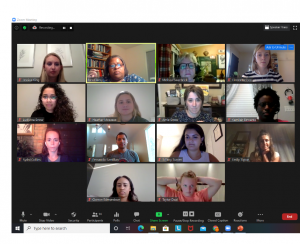
Some of our August 2020 new students start their first class
What do a Director of Community and Economic Development for a California city, a Marketing Manager for BNSF Railway in Texas, and a Corporate Social Responsibility Coordinator at Lenovo in Raleigh, NC have in common? All 3 of them began the online format of the Masters of Public Administration program at UNC Chapel Hill yesterday! They joined 11 other exceptional students to embark on a journey that provide them with a valuable skillset to take with them wherever they serve.
We want to introduce and welcome all 14 of our new August online students to the program! We could not be happier with the breadth of experience and their individual areas of interest which will bring so much to the learning environment. Among the other students in the cohort are an Animal Rights Advocate, a Higher Education Administrator at Appalachian State University, a project manager at the Federal Reserve Bank of Richmond, and a freelance Videographer/Story Creator for non-profits in California.
Our cohorts always bring together students with a broad array of backgrounds and demographics. This cohort is no exception. We’d like to highlight a few of them here:
As my PWE enters its final few weeks, I have been working on finishing several long-term projects, including the presentations for the Opioid Response Project that I spoke about last week. My other major product for that project has been the Online Resource Library that will be put up on its current microsite, and eventually the permanent website that will launch sometime in late fall or early winter. This library contains well over a hundred resources, in ten different subject areas compiled over the course of the two-year project by multiple participants, including past research assistants. Its purpose is to codify the resources created and shared by our community teams, as well as ones that would assist communities in undertaking a collective impact-style response to the opioid crisis. Although there is a guidebook in production that specifically focuses on the implementation of a collective impact project, these resources are substance use-specific, and can assist organizations who are in any stage of addressing opioids in their communities.
While working on this product, there have been many thumbs in this metaphorical pie. Since this project involved many staff and faculty members from across the SOG, it has a series of subcommittees, including one for the website. But because the project is being managed through ncIMPACT, there is an input and review process there as well. This means that I have had to manage the expectations and ideas of many individuals as I create this product, including people who have not had the chance to see the library or been involved in its compilation. Although this has at times made creating this resource more difficult, it has also raised useful questions about its purpose, format, and realistic usefulness in the wider community. For example, these conversations led to the decision to add a brief context statement to each resource and category, so that users do not have to actually click on or read the resource in order to see if it is useful to them. This made the library a much more time-intensive product for me, but will also make it much more helpful to the public audience it is meant to serve.
Creating products for a general audience is something that I have learned much more about during this PWE experience. I have been involved in academia for almost seven years now, and see it as my future career. My perspective, writing, and priorities often reflect that bias. Although I realize the importance of public-focused work, I have traditionally felt uncomfortable creating resources for this audience. How was I supposed to know what people wanted or needed? How was I, with an outsider’s perspective, going to be able to create something that would assist communities in a real, tangible way? Working with ncIMPACT has given me a much more nuanced perspective of making research and project results accessible to those who they affect most. I still know that I have an outsider’s perspective, but now I am able to speak with professionals and clients to understand how resources like this one can best support them. I am also more able to put myself into the shoes of others, and think critically about how to most efficiently communicate this information to a non-academic audience. Being able to learn more about the crossroads of policy, research, practitioners, and communities is helping me grow as a professional, and put the “social” in social worker and the “public” in public administrator.
Writing this blog has been difficult this week, as our country cries out in pain and anger and demands change of our institutions. The murders of George Floyd and Breonna Taylor by police in Minneapolis and Louisville have inspired global protests, including in all 50 US states. There are hundreds of thousands of people demanding justice in cities all over the country, including Raleigh, Durham, Chapel Hill, Charlotte, Greensboro, Fayetteville, Wilmington, and more in North Carolina alone. All of this is, of course, in the context of the systemic racism experienced by people of color – violence from police, but also disparities in every major health and wellbeing indicator, the trauma and chronic stress of interpersonal and institutional racism, and the reality that to many Americans, their lives matter less than their white counterparts. And I want to make it clear: Black Lives Matter, and it’s our responsibility as individuals and professionals to change the systems we work in to be anti-racist and anti-oppressive.
Working for a governmental organization is hard right now, as someone whose partner, best friend, and colleagues are Black. I recognize the complicity of all of our governmental institutions in racism, simply because of our nation’s history as one built on genocide and slavery. And I honestly didn’t know what to write about for MPA Matters that would not seem either tone deaf or overly political. I was worried not only that my words would not be sufficient, but also that they may not be appropriate for this platform. However, I argue that as we MPA students work in our PWEs this summer, that it is our duty to not only observe government’s functions and build our own skills, but also challenge the assumptions on which these organizations rest.
That challenge may not be the same for everyone; as an employee of the School of Government, my work must remain understandably policy neutral in order to engage elected officials and administrators from all corners of our state. And ncIMPACT’s work, including all of the projects on which I am working, are focused on making the lives of vulnerable populations, including Black North Carolinians, better, safer, and more prosperous. I can take some comfort in the fact that my efforts will effect some change, for individuals and communities if not the systems themselves. However, there is so much more to be done, personally, professionally, and institutionally, to address my and our roles in white supremacy and anti-black violence. My hope is that after the protests are over – when police have put down their tear gas and rubber bullets – that we all maintain the same level of urgency we feel now for change, unity, and the value of Black lives.
With National Census Day (April 1) upon us, I wanted to talk about how important Census responses and data are for public administrators.

State and local governments, and even nonprofits, can use census data for descriptive analyses to describe the demographic diversity within a jurisdiction or assessments to understand the communities needs and target program and policy efforts effectively. Governments can use the data to help with planning related to public-policy decision making, including the day-to-day decision-making process.
Here are some ways that public administrators around you have used Census data:
Census data can serve so many purposes; these were just a few! So please remember to complete your 2020 Census! This has a huge impact on what public administrators will understand about our communities for the next 10 years.
Complete your 2020 Census online at my2020census.gov, by phone at 844-330-2020, or by mail when the physical questionnaire arrives in mid-April.
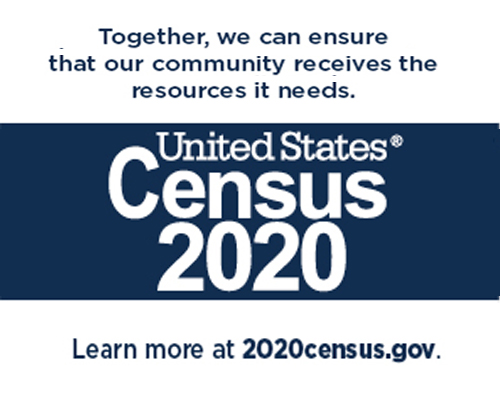
For the first time in history, North Carolina does not have an approved budget as operations of the new fiscal year are underway. Thanks to current law, there will be no government shutdown and the budget will continue to run on auto-pilot based off of last year’s budget provisions. However, we have had four days of postponed votes in the House on the potential veto override of HB 966, and there is still no conclusion on how the General Assembly plans to address the budget for the 2019-2021 biennium.
While we wait for a decision to be made on the next steps for the budget, whether they go for the override, draft continuing resolutions, or continue operating on auto-pilot, education bills have been flying through committees and sessions this week. Bills regarding teacher contract changes and new personal finance courses (SL 2019-82) as well as studies on the challenges of being an NC Pre-K site (SL 2019-87)have become session law this past week. There were a handful of bills ratified and sent to the Governor this week, including bills modifying the school success indicator (HB 411), higher education changes (HB 668), educator preparation program changes (HB 107), and adjusting the performance grading to a 15-point scale (HB 362).
There were many more education bills that moved through committees and crossed from one chamber to the other this week that will continue moving next week. It is so easy to get caught up in the bills that mandate DPI do something or directs the State Board to do something or requires the Superintendent to do something, but this week I really enjoyed following bills that directly impact and benefit students (which is of course why I am here).
SB 354: Sam’s Law would make the following changes:
The plans would require documentation from the following:
The school would be provided at least one unopened dosage of the medication from the parent and the school is required to safely and securely store the medication in an accessible location for trained school personnel and volunteers. This bill aims to eliminate the potential detrimental consequences of schools being underprepared for assisting students with seizure disorders.
SB 391: Expand Youth Internship Opportunities
Current law restricts youth under age 18 from being employed in occupations that have been declared hazardous by the US Department of Labor or deemed detrimental to youth by the NC Commission of Labor. These occupations include:
This bill creates an exception for youth ages 16-18 to participate in supervised experiences in occupations found detrimental by the Commissioner of Labor. The following conditions must be met to be eligible for the exception:
Aside from tracking and reviewing bills this week, I have also worked on proposing the amount of funding to be granted to school districts from the Mobile App Development Grant Program. It is actually awesome to see the partnerships that have developed between employers and schools and how these schools are using funds to create courses that prepare students for future work with that employer. I have also gotten to review applications for the State Board Student Advisors positions; there are only two positions (one junior, one senior) that are filled by students who serve as the representatives on the Board. We get to begin interviewing this week, and I actually suggested to the interview team best practices for interviewing candidates from HR class LOL.
Most fun I have had this week was attending networking events with my bosses. Here is a pic of me with my building from an event this week 🙂
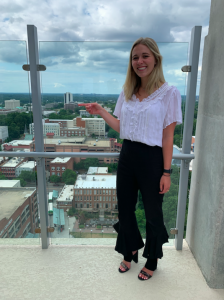
Me & the Education Building
Boy oh boy has this week been an interesting one to say the least. Both of my bosses on the Legislative Team have been on much needed vacations so it has been just me holding down the fort over at the General Assembly. As much as I was out of my comfort zone walking around without my bosses who know, quite literally, everyone, it felt good to walk around the legislature, confidently waving back to the lobbyists, legislative assistants, representatives and senators that have started recognizing me even without my bosses.
The conference report on the budget for the 2019-2021 biennium was released Tuesday afternoon following a press conference led by Senate and House leadership. While many people in both parties are happy with most aspects of the budget, there are some still very upset that the legislature chose not to include Medicaid expansion. Meanwhile, our departments over at DPI were all in looking at the education provisions and the comparison between the budget proposals from the Governor, House, Senate, and Conference Proposed Budgets Comparison (xlsx, 143kb) which are far too vast to fully discuss here. While there was plenty of debate surrounding the budget, it was still encouraging to see people work together to help each individual county in North Carolina, especially our teachers!
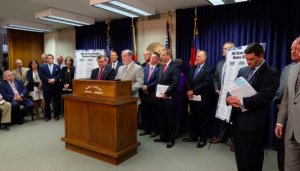
Boy oh boy… Budget Report Press Conference
As noted in my bio and past blogs and as evident through my choice in PWE, I am an avid supporter of all levels of education from early childhood to higher Ed and graduate education. After attending a multitude of house and senate education committees, I was able to attend breakfast with a Senator that serves on the Senate Committee on Education- Higher Ed and K-12. He and I discussed education, immigration, public safety, insurance, motor vehicle laws, and many other policy issues—subsequently relating back how all of these policy issues directly and indirectly impact the children in our schools. Even more interesting (IDK what could be more interesting than education policy), we discussed our varying love for coffee (not Starbucks) and the Senator’s visits to the tobacco and coffee farms in Central and South America. Lastly, the Senator referred to the women in the Senate as “Rock Stars,” as he said we need more people like them (I concur).
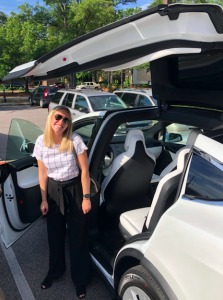
Boy oh boy… Checking out the Senator’s newly leased Tesla ~feeling fly~
P.S. If you ever go to Flying Biscuit in the Raleigh area, get their “creamy dreamy grits” 10/10 recommend.
Finally, I had to do miscommunication management on a bill brought up in Senate Education Committee this week. A bill originally about Vacation Rentals was severely altered with a Proposed Committee Substitute to move the School Insurance Fund Section of the Department of Public Instruction that oversees insurance for LEAs (schools) to the Department of Insurance. The issue with the PCS is that DPI had not been aware of any changes being made to their insurance fund for LEAs. DPI representatives addressed the committee, telling them about their confusion with the bill. Consequently, a senator asked the bill sponsor if the Superintendent supported the bill. I am going to positively assume that there was a miscommunication, because the bill sponsor responded that the Superintendent does support the bill. Having my bosses out of town and being “just the intern,” I was stuck speechless. Following multiple calls and informal meetings, the big bosses were able to do some damage control so we shall see where the bill proceeds next…
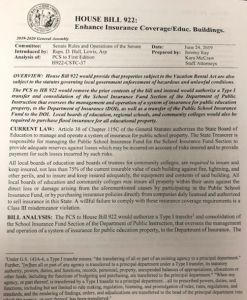
HB 922 PCS- DPI to DOI
Needless to say, it was a pretty eventful week and boy oh boy am I ready for @Kevin and @Wade to be back from vacation! No one EVER said government was going to be easy and I absolutely love that about it 🙂
It’s been a wild couple weeks meeting with legislators to ensure the necessary education provisions are included in the budget. As we wait for conference to come to an end, we are hopeful that increases in teacher pay, classroom school supply funding for teachers, computer science programming, school lunch co-pay vouchers, and many other provisions will be included in the budget. It will get crazy intense once we see what Governor Cooper chooses to do, considering there is no talk of Medicaid expansion in the budget currently. Right now, it’s just a waiting game…
In the meantime, I have been attending House and Senate Rules, Education, and Appropriations committees that have any of our bills that we are tracking. We’ve heard, met about, and spoke on bills pertaining to career and technical education (CTE), rehiring high-need teachers that have retired, expanding youth internship opportunities, approval of charter school facility bonds, modification of the school quality/student success indicator, modifying teacher licensing requirements, advanced math course enrollment, and many others that we have our hands in.
It has been interesting to see the dynamic of an elected Public Administrator of education. Most states have an appointed Superintendent or Commissioner of education, rather than an elected one. The impact of elections and public scrutiny definitely take a toll on positions like the Superintendents, and seem to restrict him and his office from trying new ideas, piloting programs, and making riskier choices that could be beneficial to schools, teachers, and students. While many people demand change, they do not respond positively when changes are made—to put myself in his shoes, it has to be SO challenging to be a young official with new ideas to offer that is consistently shut down when introducing new ideas. Talking with a state board member brought up this difference in appointed and elected superintendents. If this position was appointed, he or she would not be so dependent on the sway of elections; rather, he or she could make choices that experts and researchers may suggest but that the average joe may not understand. That gets back to the question, though, of whether or not these administrators are there to serve the “will of the people” or to do what’s best for the people (those two may not always align).
The most fun part of my job thus far is working with my bosses (@Kevin @Wade) on the Legislative Team who always keep me laughing. They have introduced me to literally HUNDREDS of people at DPI and in the legislature. While it’s been a whirlwind, I am finally catching on to the norms, culture, and power structures of the varying groups and agencies that come together (or push apart) during this budget season. Looking back over my courses of the past year, I have seen an accumulation of institutions and values of public administration and politics, law of course, communication (communication, communication, communication!!!), research and evaluation, intergovernmental relations, organizational theory, human resources, and BUDGETing—Turns out, I’ve learned a few things over the year! And I have loved seeing it in action these past few weeks.